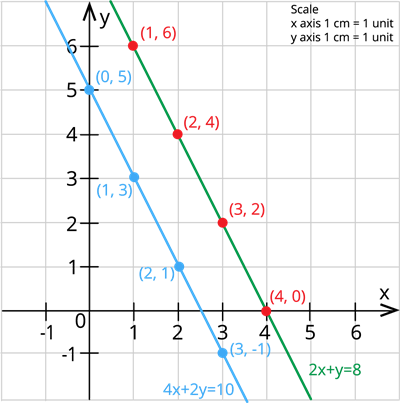
PUMPA - SMART LEARNING
எங்கள் ஆசிரியர்களுடன் 1-ஆன்-1 ஆலோசனை நேரத்தைப் பெறுங்கள். டாப்பர் ஆவதற்கு நாங்கள் பயிற்சி அளிப்போம்
Book Free DemoLet us consider the system of linear equations and find the solution graphically.
Find the solution to the system of equations 2x+y=8 and 4x+2y=10 graphically.
Solution:
Let us consider the equation 2x+y=8. Now, we shall substitute the values for x to find the value of y.
When x=1, 2(1)+y=8\Rightarrow y=8-2\Rightarrow y=6
When x=2, 2(2)+y=8\Rightarrow y=8-4\Rightarrow y=4
When x=3, 2(3)+y=8\Rightarrow y=8-6\Rightarrow y=2
When x=4, 2(4)+y=8\Rightarrow y=8-8\Rightarrow y=0
Now, writing these values in the table, we have:
| x | 1 | 2 | 3 | 4 |
| y | 6 | 4 | 2 | 0 |
Similarly, plotting the points for the equation 4x+2y=10, we have:
When x=0, 4(0)+2y=10\Rightarrow 2y=10\Rightarrow y=5
When x=1, 4(1)+2y=10\Rightarrow 2y=10-4=6\Rightarrow y=3
When x=2, 4(2)+2y=10\Rightarrow 2y=10-8=2\Rightarrow y=1
When x=3, 4(3)+2y=10\Rightarrow 2y=10-12=-2\Rightarrow y=-1
Now, writing these values in the table, we have:
| x | 0 | 1 | 2 | 3 |
| y | 5 | 3 | 1 | -1 |
Now, plotting these points in the graph, we have:

Since the two lines in the graph do not intersect at any point, the graph is said to be an inconsistent system and has no solution.
Another method:
Consider writing the two equations 2x+y=8 and 4x+2y=10 in the form of y = mx + c and determine the slope.
Solution:
The slope of the equation 2x + y = 8 is given by:
y = -2x + 8
The slope of the equation 2x + y = 8 is -2.
The slope of the equation 4x + 2y = 10 is given by:
2y = -4x + 10
y = -2x + 5
The slope of the equation 4x + 2y = 10 is -2.
Important!
When writing these two equations in the form of y = mx+c, both the equations have the same slope. This proves that the two lines are parallel and does not have a point of intersection.